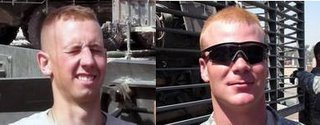US Military Struggles to Quell Violence in Iraq

Spc. Kenneth Cross, 21, and Pfc. Daniel Dolan, 19, are the two most recent deaths in the effort. Both were posthumously promoted — Cross to corporal, Dolan to specialist.
Earlier this month, the U.S. military deployed several thousand extra combat troops to flashpoint districts in the troubled Iraqi capital of Baghdad. The security operations are part of a joint U.S.-Iraqi effort to halt escalating sectarian violence and shore up support for Iraq's struggling government.
Huddled inside the belly of a Stryker combat vehicle, 20-year-old U.S. Army Specialist Zack Sherman quickly checks his weapon one last time as the 17-metric ton vehicle rumbles into eastern Adamiyah District.
The predominantly Sunni Arab district is one of the worst violence-wracked areas of Baghdad. In July, U.S. and Iraqi security forces recorded more than 20 attacks against them on the streets here, most involving large roadside bombs.
Specialist Sherman takes a deep breath and says he tries not to think about the dangers.
"There is no point in getting amped up or getting yourself strung out for no reason," he said.
Sherman may be taking things in stride, but this is the last place he and nearly 4,000 other soldiers attached to the 172nd Stryker Brigade Combat Team had hoped to be right now.
The brigade had just completed a year-long tour in northern and western Iraq. Some, like Sherman, had already returned to their home base in the state of Alaska for a few weeks when they were ordered back to Iraq in late July for another four months of combat duty.
This time, the troops were told to go to Baghdad, where they and their specially-designed armored vehicles were needed to help Iraqi security forces round up troublemakers and conduct door-to-door searches for weapons in various neighborhoods.
Since the fall of Saddam Hussein's regime three years ago, the U.S. military has conducted similar sweeps many times before. But those sweeps generally targeted insurgents and terrorists.
This operation, dubbed Together Forward, is the second phase of an operation that began two months ago and is largely aimed at convincing Iraqis that the country's nascent security forces are willing and capable of stopping the sectarian violence which has torn apart entire communities.
"Hello. How are you today? Pardon the intrusion into your homes and neighborhoods this morning," said Lieutenant Colonel John Norris.
On this day, the commander of the Stryker Brigade's 4th Battalion, 23rd Infantry, Lieutenant Colonel John Norris, tries to assure nervous Sunni residents in Adamiyah that help is on the way.
"We are working in cooperation with the Iraqi army, the Iraqi national police, the Iraqi police, trying to clear it of the sectarian violence and make your neighborhood safe for you and your family," he said.
Nearly all of the residents politely invite Iraqi and American soldiers to search their homes. A sizable number of Sunni Arabs serve in Iraq's new army and there appears to be some acceptance of the army in districts like Adamiyah.
But the cold stares given to the Iraqi police speak volumes about the growing sectarian divide in Iraq.
An elderly Sunni man, who would only identify himself as Omar, tells VOA that he has seen Shi'ite death squads coming to Adamiyah with the help of the Shi'ite-dominated Iraqi police.
Adamiyah is home to many people, who received special privileges from Saddam, who is a Sunni Arab. Residents, like Omar, say Shi'ites, who were brutally oppressed by Saddam, are seeking revenge.
Omar says when Adamiyah was under curfew a few weeks ago, the Iraqi national police was sent to guard the district. He says whenever masked Shi'ite militiamen showed up, the police simply let them through their checkpoints. Omar says the cooperation allowed the militiamen to capture and kill scores of Sunnis here, who were on death lists.
Another resident, who refuses to be identified, repeats what has been publicly acknowledged by U.S. and Iraqi officials, that some militiamen loyal to radical Shi'ite cleric Moqtada al-Sadr and Shi'ite cleric and politician Abdul Aziz al-Hakim, both of whom are believed to be supported by Iran, have infiltrated the national police in large numbers and may be carrying out assassinations of Sunnis.
"Police, we do not trust. There is a lot of killing on behalf of the police. Every time I see a police patrol, I get scared. The fact that there is a lot of militia inside the police gives us the shivers," he said.
The distrust of the police among Sunnis has created a serious dilemma for the U.S. military, which has been focused on training Iraq's security forces to take over from coalition troops as quickly as possible. About 3,000 U.S. military advisors are currently working with various Iraqi units to improve their performance and credibility.
In an interview with VOA, the commander of the so-called Iraq Assistance Group, U.S. Army Brigadier General Dana Pittard, says he is confident that sectarian members in the national police will not be able to undermine the credibility of the entire force.
"There are some influences, but it has not reached to the level of major leadership," he said. "And those leaders, who are suspected of having that influence, I truly believe that the Iraqi government will get rid of them, will remove them."
Iraqi Prime Minister Nouri al-Maliki has repeatedly promised to disband all militias. But few Sunnis believe he will honor that promise.
Shi'ite militias have backing from powerful politicians and political parties in Iraq's Shi'ite-dominated government. During Mr. Maliki's bid for the post of prime minister, he received crucial endorsement from Moqtada al-Sadr, who leads the Mahdi Army militia and controls at least 30 seats in the 275-member parliament.
Shi'ite leaders portray their militias as nothing more than neighborhood watchdogs, guarding against relentless attacks by Saddam loyalists and Sunni extremists.
Read the rest at Voice of America
Related Link:
Camp Liberty soldiers hit hard by friends’ deaths
Related Link:
Roy vigil pays tribute to fallen soldier

<< Home